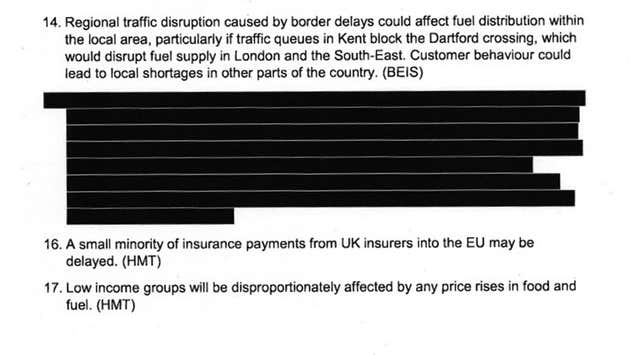
A secret Whitehall dossier has outlined the disruption the UK could face in the event of a no-deal Brexit.
But what is the document, why has it just been released, and what does it say?
Here is the PA news agency’s guide to the Operation Yellowhammer file.
– What is Yellowhammer?
Yellowhammer is a codename used by the Government relating to no-deal planning.

The Sunday Times reported in August that Yellowhammer documents outlined scenarios including that Britain would be hit with a three-month “meltdown” at its ports if it leaves without a deal.
The newspaper warned of a hard Irish border and shortages of food and medicine, and a senior Whitehall source told the paper: “This is not Project Fear – this is the most realistic assessment of what the public face with no deal. These are likely, basic, reasonable scenarios – not the worst case.”
– How did the Government react to the revelations being made public?
The Government sought to play down the documents, with Business Minister Kwasi Kwarteng dismissing them as “scaremongering”, while Michael Gove – the Cabinet minister responsible for no-deal planning – insisted Yellowhammer represented a “worst-case scenario”.

A Number 10 source said the document was from when ministers were “blocking what needed to be done to get ready to leave and the funds were not available”, adding: “It has been deliberately leaked by a former minister in an attempt to influence discussions with EU leaders.”
The source said those “obstructing preparation” are no longer in Government, with £2 billion of extra funding already made available, adding: “Whitehall has been stood up to actually do the work through the daily ministerial meetings. The entire posture of Government has changed.”
– How did others react and why did the Government publish the document?
Ex-chancellor Philip Hammond wrote to Boris Johnson demanding an apology after Number 10 sought to blame disgruntled ministers for the leak of the no-deal documents.

He said the Operation Yellowhammer file was dated August 2019 – after Mr Johnson had taken office. The Prime Minister moved to downplay the spat, saying he was “unaware” of the strength of Mr Hammond’s feelings.
Meanwhile, MPs demanded the Government publish communications connected to no-deal Brexit planning. Former attorney general Dominic Grieve’s demand for all written and electronic contact about Operation Yellowhammer (and the temporary suspension of Parliament) since July 23 to be released was approved by 311 votes to 302 on Monday September 9.
He used the parliamentary device of a humble address to the Queen to ask for the documents to be put before the Commons by ministers by no later than 11pm on Wednesday September 11. The Government published the Yellowhammer documents on Wednesday evening.
– What does the document say?
The six-page dossier – comprising 20 “key planning assumptions” – reveals that a no-deal Brexit could trigger major hold-ups at channel ports, electricity price increases, shortages of some foods and delays to medicine imports.
2/ Boris Johnson must now admit that he has been dishonest with the British people about the consequence of a no deal Brexit.
— Keir Starmer (@Keir_Starmer) September 11, 2019
HGV delays of between one-and-a-half and two-and-a-half days would occur at Dover and public disorder could increase, the document warns.
It adds: “Protests and counter-protests will take place across the UK and may absorb significant amounts of police resource.
“There may also be a rise in public disorder and community tensions.”
The Government describes the scenario outlined in the document, part of which has been redacted, as the “reasonable worst case scenario”. The document’s assumptions are “as of August 2” this year.
– What was the reaction to the published document?
Labour leader Jeremy Corbyn said the document shows the Prime Minister “is prepared to punish those who can least afford it with a no-Deal Brexit to benefit his wealthy friends” and “must be stopped”.
Official government documents confirm Boris Johnson is prepared to punish those who can least afford it with a No Deal Brexit to benefit his wealthy friends.
He must be stopped. pic.twitter.com/3aibiLn8hZ
— Jeremy Corbyn (@jeremycorbyn) September 11, 2019
Shadow Brexit secretary Sir Keir Starmer said it is “completely irresponsible for the Government to have tried to ignore these stark warnings and prevent the public from seeing the evidence”.
Former education minister Sam Gyimah – one of 21 Tory rebels who had the whip withdrawn – said the scenario outlined in the document is “a sober assessment of what could happen”.
Green MP Caroline Lucas tweeted: “It simply beggars belief that any government could be willing to contemplate a future that will cause so much pain and disruption – much less rush towards it. Is this what Boris Johnson meant by ‘do or die’? #Yellowhammer.”


Why are you making commenting on The National only available to subscribers?
We know there are thousands of National readers who want to debate, argue and go back and forth in the comments section of our stories. We’ve got the most informed readers in Scotland, asking each other the big questions about the future of our country.
Unfortunately, though, these important debates are being spoiled by a vocal minority of trolls who aren’t really interested in the issues, try to derail the conversations, register under fake names, and post vile abuse.
So that’s why we’ve decided to make the ability to comment only available to our paying subscribers. That way, all the trolls who post abuse on our website will have to pay if they want to join the debate – and risk a permanent ban from the account that they subscribe with.
The conversation will go back to what it should be about – people who care passionately about the issues, but disagree constructively on what we should do about them. Let’s get that debate started!
Callum Baird, Editor of The National
Comments: Our rules
We want our comments to be a lively and valuable part of our community - a place where readers can debate and engage with the most important local issues. The ability to comment on our stories is a privilege, not a right, however, and that privilege may be withdrawn if it is abused or misused.
Please report any comments that break our rules.
Read the rules here